Campus/People
-
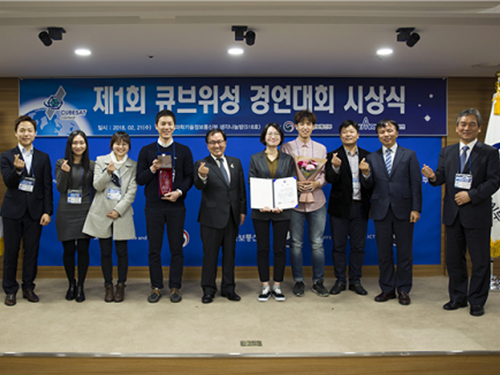 KAIST, First to Win the Cube Satellite Competition
Professor Hyochoong Bang from the Department of Aerospace Engineering and his team received the Minister of Science and ICT Award at the 1st Cube Satellite Competition.
The team actually participated in the competition in 2012, but it took several years for the awarding ceremony since it took years for the satellites to be designed, produced, and launched.
The KAIST team successfully developed a cube satellite, named ‘Little Intelligent Nanosatellite of KAIST (LINK)’ and completed its launch in April 2017.
LINK (size: 20cmx10cmx10cm, weight: 2kg) mounted mass spectrometry and Langmuir probe for Earth observation. The Langmuir probe was developed by Professor Kyoung Wook Min from the Department of Physics, KAIST.
Yeerang Lim, a PhD student from the Department of Aerospace Engineering said, “I still remember the feeling that I had on the day when LINK launched into orbit and sent back signals. I hope that space exploration is not something far away but attainable for us in near future.”
2018.02.22 View 11988
KAIST, First to Win the Cube Satellite Competition
Professor Hyochoong Bang from the Department of Aerospace Engineering and his team received the Minister of Science and ICT Award at the 1st Cube Satellite Competition.
The team actually participated in the competition in 2012, but it took several years for the awarding ceremony since it took years for the satellites to be designed, produced, and launched.
The KAIST team successfully developed a cube satellite, named ‘Little Intelligent Nanosatellite of KAIST (LINK)’ and completed its launch in April 2017.
LINK (size: 20cmx10cmx10cm, weight: 2kg) mounted mass spectrometry and Langmuir probe for Earth observation. The Langmuir probe was developed by Professor Kyoung Wook Min from the Department of Physics, KAIST.
Yeerang Lim, a PhD student from the Department of Aerospace Engineering said, “I still remember the feeling that I had on the day when LINK launched into orbit and sent back signals. I hope that space exploration is not something far away but attainable for us in near future.”
2018.02.22 View 11988 -
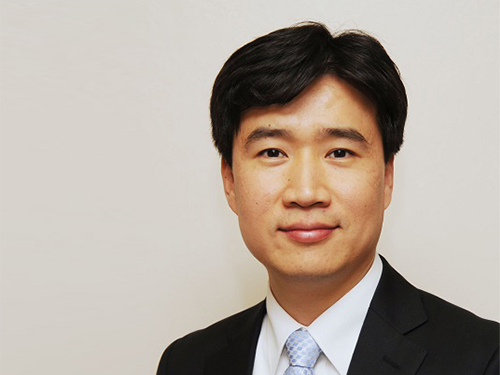 Professor Il-Doo Kim Recevies the Song-gok Award
Professor Il-Doo Kim from the Department of Materials Science and Engineering at KAIST received the 20th Song-gok Science and Technology Award from Korea Institute of Science and Technology (KSIT).
The Song-gok Science and Technology Award was established to praise the accomplishments of the first president, Hyung-seop Choi, whose penname is Song-gok. The award selects a recipient in the field of materials and technology every other year.
Professor Kim, in recognition of his outstanding research and contributions to materials science in Korea, received the award during the 52nd anniversary ceremony of KIST on February 9.
Professor Kim focuses on developing nanofiber gas sensors for diagnosing disease in advance by analyzing exhaled biomarkers with electrospinning technology.
He has published more than 211 papers and has recorded more than 9,650 citations and 50 h-index.
Professor Kim has registered 107 patents and applied 38 patents in Korea while registering 29 patents and applying 16 patents overseas. Also, he transferred four technologies in 2017.
Professor Kim is recognized as one of the researchers who is leading nanofiber technology. On January 17, he made a keynote speech at the 5th International Conference on Electrospinning, which was his fourth keynote speech at that conference.
Moreover, he received the Technology Innovation Award at the College of Engineering, KAIST on December 19, 2017.
Professor Kim said, “It is my great honor to receive the Song-gok Science and Technology Award. I would like to bring distinction to KAIST by taking the lead in the commercializing a nanofiber-based highly sensitive nanosensors, diversifying and commercializing technology using nanofiber.”
2018.02.13 View 9077
Professor Il-Doo Kim Recevies the Song-gok Award
Professor Il-Doo Kim from the Department of Materials Science and Engineering at KAIST received the 20th Song-gok Science and Technology Award from Korea Institute of Science and Technology (KSIT).
The Song-gok Science and Technology Award was established to praise the accomplishments of the first president, Hyung-seop Choi, whose penname is Song-gok. The award selects a recipient in the field of materials and technology every other year.
Professor Kim, in recognition of his outstanding research and contributions to materials science in Korea, received the award during the 52nd anniversary ceremony of KIST on February 9.
Professor Kim focuses on developing nanofiber gas sensors for diagnosing disease in advance by analyzing exhaled biomarkers with electrospinning technology.
He has published more than 211 papers and has recorded more than 9,650 citations and 50 h-index.
Professor Kim has registered 107 patents and applied 38 patents in Korea while registering 29 patents and applying 16 patents overseas. Also, he transferred four technologies in 2017.
Professor Kim is recognized as one of the researchers who is leading nanofiber technology. On January 17, he made a keynote speech at the 5th International Conference on Electrospinning, which was his fourth keynote speech at that conference.
Moreover, he received the Technology Innovation Award at the College of Engineering, KAIST on December 19, 2017.
Professor Kim said, “It is my great honor to receive the Song-gok Science and Technology Award. I would like to bring distinction to KAIST by taking the lead in the commercializing a nanofiber-based highly sensitive nanosensors, diversifying and commercializing technology using nanofiber.”
2018.02.13 View 9077 -
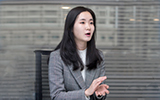 First Female Grand Prize Awardee of Samsung Humantech
Yeunhee Huh, PhD candidate (Professor Gyu-Hyeong Cho) from the School of Electrical Engineering received the grand prize of the 24th Humantech Paper Award. She is the first female recipient of this prize since its establishment in 1994. The Humantech Paper Award is hosted by Samsung Electronics and sponsored by the Ministry of Science and ICT with JoongAng Daily Newspaper. Her paper is titled, ‘A Hybrid Structure Dual-Path Step-Down Converter with 96.2% Peak Efficiency using 250mΩ Large-DCR Inductor’. Electronic devices require numerous chips and have a power converter to supply energy adequately. She proposed a new structure to enhance energy efficiency by combining inductors and capacitors. Enhancing energy efficiency can reduce energy loss, which prolongs battery hours and solves overheating of devices; for instance, energy loss leads to the overheating issue affecting phone chargers. This technology can be applied to various electronic devices, such as cell phones, laptops, and drones. Huh said, “Power has to go up in order to meet customers’ needs; however the overheating problem emerges during this process. This problem affects surrounding circuits and causes other issues, such as malfunctions of electronic devices. This technology may vary according to the conditions, but it can enhance energy efficiency up to 4%.”During the ceremony, about eight hundred million KRW worth cash prizes was conferred to 119 papers. KAIST (44 papers) and Gyeonggi Science High School (6 papers) received special awards given to the schools.
2018.02.12 View 9880
First Female Grand Prize Awardee of Samsung Humantech
Yeunhee Huh, PhD candidate (Professor Gyu-Hyeong Cho) from the School of Electrical Engineering received the grand prize of the 24th Humantech Paper Award. She is the first female recipient of this prize since its establishment in 1994. The Humantech Paper Award is hosted by Samsung Electronics and sponsored by the Ministry of Science and ICT with JoongAng Daily Newspaper. Her paper is titled, ‘A Hybrid Structure Dual-Path Step-Down Converter with 96.2% Peak Efficiency using 250mΩ Large-DCR Inductor’. Electronic devices require numerous chips and have a power converter to supply energy adequately. She proposed a new structure to enhance energy efficiency by combining inductors and capacitors. Enhancing energy efficiency can reduce energy loss, which prolongs battery hours and solves overheating of devices; for instance, energy loss leads to the overheating issue affecting phone chargers. This technology can be applied to various electronic devices, such as cell phones, laptops, and drones. Huh said, “Power has to go up in order to meet customers’ needs; however the overheating problem emerges during this process. This problem affects surrounding circuits and causes other issues, such as malfunctions of electronic devices. This technology may vary according to the conditions, but it can enhance energy efficiency up to 4%.”During the ceremony, about eight hundred million KRW worth cash prizes was conferred to 119 papers. KAIST (44 papers) and Gyeonggi Science High School (6 papers) received special awards given to the schools.
2018.02.12 View 9880 -
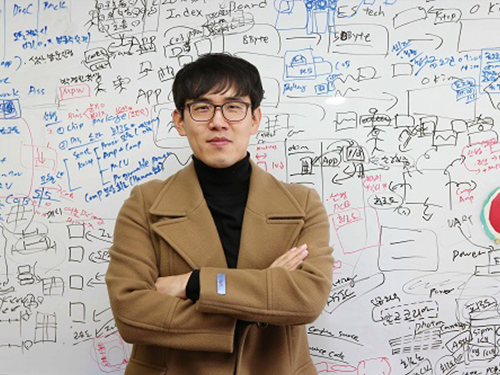 Professor Hojong Chang Wins the Best Paper Award at ISIITA 2018
Professor Hojong Chang from the KAIST Institute won the best paper award at the International Symposium on Innovation in Information Technology and Application (ISIITA) 2018.
ISIITA is a global networking symposium in which leading researchers in the field of information technology and applications gather to exchange knowledge on technological convergence.
Professor Chang won the prize for his paper, titled ‘A Study on the Measurement of Aptamer in Urine Using SiPM’.
This paper proposes using aptamer to measure and analyze the density of sodium and potassium contained in urine, allowing diseases to be diagnosed in advance.
Professor Chang said, “With a point-of-care test system that facilitates a quick diagnosis without extra processes, such as centrifugation, it is possible to get an early diagnosis and check infection in real time. Through generalizing this crucial technology, we expect to develop adequate technology for enhancing quality of life.
2018.02.12 View 8699
Professor Hojong Chang Wins the Best Paper Award at ISIITA 2018
Professor Hojong Chang from the KAIST Institute won the best paper award at the International Symposium on Innovation in Information Technology and Application (ISIITA) 2018.
ISIITA is a global networking symposium in which leading researchers in the field of information technology and applications gather to exchange knowledge on technological convergence.
Professor Chang won the prize for his paper, titled ‘A Study on the Measurement of Aptamer in Urine Using SiPM’.
This paper proposes using aptamer to measure and analyze the density of sodium and potassium contained in urine, allowing diseases to be diagnosed in advance.
Professor Chang said, “With a point-of-care test system that facilitates a quick diagnosis without extra processes, such as centrifugation, it is possible to get an early diagnosis and check infection in real time. Through generalizing this crucial technology, we expect to develop adequate technology for enhancing quality of life.
2018.02.12 View 8699 -
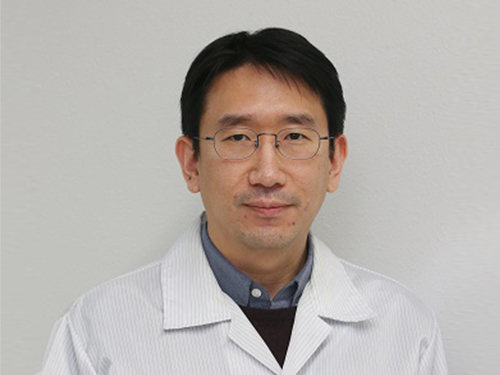 Professor Jungwon Kim Wins Haerim Optics and Photonics Award
(Professor Jungwon Kim)
Professor Jungwon Kim from the Department of Mechanical Engineering received the 8th Haerim Optics and Photonics Award from the Optical Society of Korea (OSK).
He was recognized for his dedication to pioneering the field of microwave photonics by developing ultra-low noise fiber photonics lasers.
The Haerim Optics and Photonics Award is given to an outstanding researcher who has made academic contributions in the field of optics and photonics for the last five years.
The name of the award (Haerim) comes from the pen-name of the renowned scholar, Professor Un-Chul Paek, because it is maintained using funds he contributed to the OSK.
The OSK will confer the award on February 8 during the 29th OSK Annual Meeting and Winter Conference of 2018.
2018.02.07 View 8217
Professor Jungwon Kim Wins Haerim Optics and Photonics Award
(Professor Jungwon Kim)
Professor Jungwon Kim from the Department of Mechanical Engineering received the 8th Haerim Optics and Photonics Award from the Optical Society of Korea (OSK).
He was recognized for his dedication to pioneering the field of microwave photonics by developing ultra-low noise fiber photonics lasers.
The Haerim Optics and Photonics Award is given to an outstanding researcher who has made academic contributions in the field of optics and photonics for the last five years.
The name of the award (Haerim) comes from the pen-name of the renowned scholar, Professor Un-Chul Paek, because it is maintained using funds he contributed to the OSK.
The OSK will confer the award on February 8 during the 29th OSK Annual Meeting and Winter Conference of 2018.
2018.02.07 View 8217 -
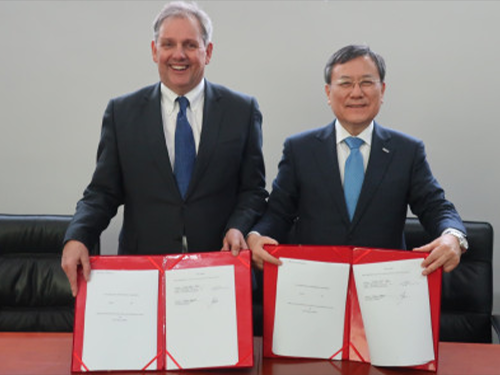 KAIST to Host the THE Innovation & Impact Summit in 2019
KAIST and Times Higher Education (THE) agreed to co-host the THE Innovation & Impact Summit at KAIST from April 1 to 3, 2019.
Global leaders from higher education, government, and industry will gather at KAIST to discuss how universities can better innovate for creating a greater impact.
(from left: THE Managing Director Trevor Barratt and KAIST President Sung-Chul Shin)
President Sung-Chul Shin and Trevor Barratt, managing director at the THE, signed an agreement to host the 2019 THE Innovation & Impact Summit at KAIST next April. The agreement was signed on February 6 during the THE Asia Universities Summit held at SUSTech in Shenzhen in China. Phil Baty, editorial director at the THE was also present during the agreement.
By hosting the 2019 THE Innovation & Impact Summit, KAIST has a chance to introduce its innovative research and performance and its educational environment and startup ecosystem to the world. Having educational and industrial leaders meet at KAIST will add more power to the global status and capacity of KAIST.
The THE Innovation & Impact Summit, first held in 2017, is one in the seven presidential summit series held by THE. During the second summit at KAIST, THE will launch their world university innovation rankings for the first time.
As innovation at universities and its impact have been a crucial indicator in building an institutional brand and reputation, leading universities are gearing up to encourage startups and entrepreneurship education. Even more, innovation at universities is emerging as one of the growth engines of economies.
The innovation indicators of KAIST have been highly recognized by many global ranking institutions in terms of the volume of patents and the patents-to-article citation impact. Thomson Reuters has recognized KAIST for two consecutive years as the most innovative university in Asia, and sixth in the world.
President Shin has high expectations for the hosting of the Innovation & Impact Summit at KAIST. He explained, “Innovation makes up the DNA of KAIST and it has been our institutional mission from the start in 1971. KAIST was commissioned to make innovation for industrialization and economic development through education and research. I do not see any university more suitable than KAIST to host this innovation summit. I hope the summit at KAIST will serve as a global platform to provide very creative ideas for making innovation and collaboration among the leading universities for all the participants.”
Meanwhile, at the THE Asia Universities Summit in Shenzhen, how to respond to the implications of the Fourth Industrial Revolution was the key agenda piercing the two-day sessions.
As a panelist, President Shin shared his experiences on innovative strategies viable for spearheading university reform for the Fourth Industrial Revolution, along with Vice-Chancellor of the University of Sheffield Sir Keith Burnett, President of Monash University Margaret Gardner, and President of Hong Kong Polytechnic University President Timothy W. Tong. He said that universities should foster young talents by equipping them with creativity, collaboration, and convergent minds. To swiftly respond to the new industrial environment, President Shin said that universities should remove the high barriers between departments and establish cross- and inter-disciplinary education systems, convergence research and technology commercialization.
2018.02.06 View 9649
KAIST to Host the THE Innovation & Impact Summit in 2019
KAIST and Times Higher Education (THE) agreed to co-host the THE Innovation & Impact Summit at KAIST from April 1 to 3, 2019.
Global leaders from higher education, government, and industry will gather at KAIST to discuss how universities can better innovate for creating a greater impact.
(from left: THE Managing Director Trevor Barratt and KAIST President Sung-Chul Shin)
President Sung-Chul Shin and Trevor Barratt, managing director at the THE, signed an agreement to host the 2019 THE Innovation & Impact Summit at KAIST next April. The agreement was signed on February 6 during the THE Asia Universities Summit held at SUSTech in Shenzhen in China. Phil Baty, editorial director at the THE was also present during the agreement.
By hosting the 2019 THE Innovation & Impact Summit, KAIST has a chance to introduce its innovative research and performance and its educational environment and startup ecosystem to the world. Having educational and industrial leaders meet at KAIST will add more power to the global status and capacity of KAIST.
The THE Innovation & Impact Summit, first held in 2017, is one in the seven presidential summit series held by THE. During the second summit at KAIST, THE will launch their world university innovation rankings for the first time.
As innovation at universities and its impact have been a crucial indicator in building an institutional brand and reputation, leading universities are gearing up to encourage startups and entrepreneurship education. Even more, innovation at universities is emerging as one of the growth engines of economies.
The innovation indicators of KAIST have been highly recognized by many global ranking institutions in terms of the volume of patents and the patents-to-article citation impact. Thomson Reuters has recognized KAIST for two consecutive years as the most innovative university in Asia, and sixth in the world.
President Shin has high expectations for the hosting of the Innovation & Impact Summit at KAIST. He explained, “Innovation makes up the DNA of KAIST and it has been our institutional mission from the start in 1971. KAIST was commissioned to make innovation for industrialization and economic development through education and research. I do not see any university more suitable than KAIST to host this innovation summit. I hope the summit at KAIST will serve as a global platform to provide very creative ideas for making innovation and collaboration among the leading universities for all the participants.”
Meanwhile, at the THE Asia Universities Summit in Shenzhen, how to respond to the implications of the Fourth Industrial Revolution was the key agenda piercing the two-day sessions.
As a panelist, President Shin shared his experiences on innovative strategies viable for spearheading university reform for the Fourth Industrial Revolution, along with Vice-Chancellor of the University of Sheffield Sir Keith Burnett, President of Monash University Margaret Gardner, and President of Hong Kong Polytechnic University President Timothy W. Tong. He said that universities should foster young talents by equipping them with creativity, collaboration, and convergent minds. To swiftly respond to the new industrial environment, President Shin said that universities should remove the high barriers between departments and establish cross- and inter-disciplinary education systems, convergence research and technology commercialization.
2018.02.06 View 9649 -
 Three Professors Named KAST Fellows
(Professor Dan Keun Sung at the center)
(Professor Y.H. Cho at the center)
(Professor K.H. Cho at the center)
The Korean Academy of Science and Technology (KAST) inducted three KAIST professors as fellows at the New Year’s ceremony held at KAST on January 12. They were among the 24 newly elected fellows of the most distinguished academy in Korea. The new fellows are Professor Dan Keun Sung of the School of Electrical Engineering, Professor Kwang-Hyun Cho of the Department of Bio and Brain Engineering, and Professor Yong-Hoon Cho of the Department of Physics.
Professor Sung was recognized for his lifetime academic achievements in fields related with network protocols and energy ICT. He also played a crucial role in launching the Korean satellites KITSAT-1,2,3 and the establishment of the Satellite Technology Research Center at KAIST.
Professor Y.H.Cho has been a pioneer in the field of low-dimensional semiconductor-powered quantum photonics that enables quantum optical research in solid state. He has been recognized as a renowned scholar in this field internationally.
Professor K.H.Cho has conducted original research that combines IT and BT in systems biology and has applied novel technologies of electronic modeling and computer simulation analysis for investigating complex life sciences. Professor Cho, who is in his 40s, is the youngest fellow among the newly inducted fellows.
2018.01.16 View 15013
Three Professors Named KAST Fellows
(Professor Dan Keun Sung at the center)
(Professor Y.H. Cho at the center)
(Professor K.H. Cho at the center)
The Korean Academy of Science and Technology (KAST) inducted three KAIST professors as fellows at the New Year’s ceremony held at KAST on January 12. They were among the 24 newly elected fellows of the most distinguished academy in Korea. The new fellows are Professor Dan Keun Sung of the School of Electrical Engineering, Professor Kwang-Hyun Cho of the Department of Bio and Brain Engineering, and Professor Yong-Hoon Cho of the Department of Physics.
Professor Sung was recognized for his lifetime academic achievements in fields related with network protocols and energy ICT. He also played a crucial role in launching the Korean satellites KITSAT-1,2,3 and the establishment of the Satellite Technology Research Center at KAIST.
Professor Y.H.Cho has been a pioneer in the field of low-dimensional semiconductor-powered quantum photonics that enables quantum optical research in solid state. He has been recognized as a renowned scholar in this field internationally.
Professor K.H.Cho has conducted original research that combines IT and BT in systems biology and has applied novel technologies of electronic modeling and computer simulation analysis for investigating complex life sciences. Professor Cho, who is in his 40s, is the youngest fellow among the newly inducted fellows.
2018.01.16 View 15013 -
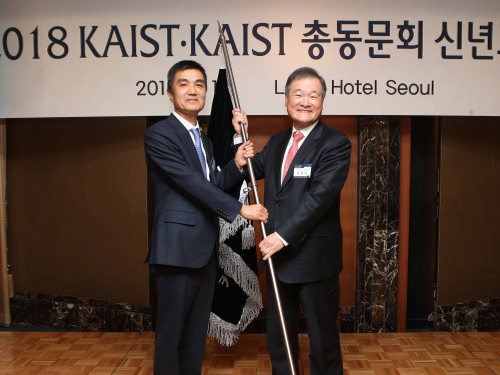 Harnessing the Strength of KAIST Alumni: New Head of KAA Inaugurated
KAIST alumni gathered in Seoul on January 13 to celebrate the New Year and the newly-elected leadership of the KAIST Alumni Association (KAA). More than 300 alumni, including President Sung-Chul Shin who is also an alumnus of KAIST, joined the gala event held at the Lotte Hotel.
Photo: Ki-Chul Cha(left) and Jung Sik Koh(right)
The KAA inaugurated its new president, Ki-Chul Cha, who was preceded by Jung Sik Koh, the former CEO at the Korea Resources Corporation. His term starts from January 2018 to December 2020.
Cha is the CEO of Inbody Co Ltd., a global company specializing in developing and selling medical instruments, such as a body composition analyzers, and medical solutions. He is also an adjunct professor in the Department of Mechanical Engineering at Yonsei University. Cha obtained a master’s degree in Mechanical Engineering at KAIST in 1980, and a Ph.D. in Bioengineering at the University of Utah, before finishing his post-doc fellowship at Harvard Medical School.
Cha plans to explore the idea that alumni engagement, saying, “KAIST stays as a home in the memories of 60,000 alumni. I will dedicate myself to stimulating the alumni association to make KAISTians proud.”
At the gala event, the KAA awarded the Alumni of the Year honor to six alumni who distinguished themselves in the areas of professional achievement, humanitarianism, and public service. They are the Director of Startup KAIST Professor Byoung Yoon Kim; President of LG Chem Ltd and Head of Battery Research and Development Myung Hwan Kim; Director of INNOX Advanced Materials Co., Ltd Kyung Ho Chang; Vice President of the Korea International Trade Association Jung-Kwan Kim; CEO of Samsung Electro-Mechanics Yun-Tae Lee; and CEO of ENF Technology Jinbae Jung.
Photo: President Shin(far right) poses with six awardees of the Distinguished Alumni Award and the former President of KAA, Koh(far left)
2018.01.16 View 11314
Harnessing the Strength of KAIST Alumni: New Head of KAA Inaugurated
KAIST alumni gathered in Seoul on January 13 to celebrate the New Year and the newly-elected leadership of the KAIST Alumni Association (KAA). More than 300 alumni, including President Sung-Chul Shin who is also an alumnus of KAIST, joined the gala event held at the Lotte Hotel.
Photo: Ki-Chul Cha(left) and Jung Sik Koh(right)
The KAA inaugurated its new president, Ki-Chul Cha, who was preceded by Jung Sik Koh, the former CEO at the Korea Resources Corporation. His term starts from January 2018 to December 2020.
Cha is the CEO of Inbody Co Ltd., a global company specializing in developing and selling medical instruments, such as a body composition analyzers, and medical solutions. He is also an adjunct professor in the Department of Mechanical Engineering at Yonsei University. Cha obtained a master’s degree in Mechanical Engineering at KAIST in 1980, and a Ph.D. in Bioengineering at the University of Utah, before finishing his post-doc fellowship at Harvard Medical School.
Cha plans to explore the idea that alumni engagement, saying, “KAIST stays as a home in the memories of 60,000 alumni. I will dedicate myself to stimulating the alumni association to make KAISTians proud.”
At the gala event, the KAA awarded the Alumni of the Year honor to six alumni who distinguished themselves in the areas of professional achievement, humanitarianism, and public service. They are the Director of Startup KAIST Professor Byoung Yoon Kim; President of LG Chem Ltd and Head of Battery Research and Development Myung Hwan Kim; Director of INNOX Advanced Materials Co., Ltd Kyung Ho Chang; Vice President of the Korea International Trade Association Jung-Kwan Kim; CEO of Samsung Electro-Mechanics Yun-Tae Lee; and CEO of ENF Technology Jinbae Jung.
Photo: President Shin(far right) poses with six awardees of the Distinguished Alumni Award and the former President of KAA, Koh(far left)
2018.01.16 View 11314 -
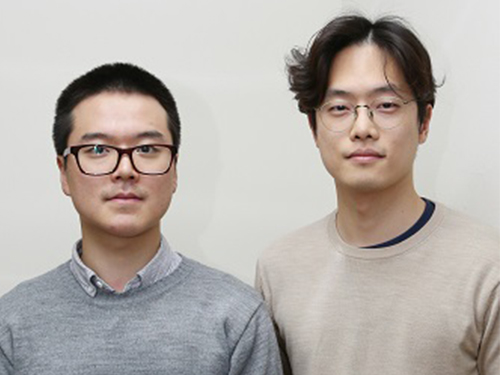 KAIST Students Invited to the BNL
Siheon Ryee and Taek Jung Kim, combined Masters and PhD students from the Department of Physics, have been invited to be visiting researchers at the Brookhaven National Laboratory (BNL).
The BNL, located in Long Island, New York, is one of the most esteemed institutes in the United States. Ryee and Kim received the invitation from the Center for Computational Design of Functional Strongly Correlated Materials and Theoretical Spectroscopy. This center was established by scholars who have been leading this field in the United States.
The two students will be participating in developing a methodology and code for calculating strongly correlated electronic materials, and a grant of 40,000 USD will be provided to each student. This amount of support is not often awarded to researchers outside of postdoctoral programs.
Moreover, they are guaranteed to continue their combined Masters and PhD program and write their dissertations under the supervision of their advisor, Professor Myung Joon Han from the Department of Physics.
Professor Han said, “I was impressed by how well-known scholars established the center in order to cooperate with each other to solve challenging problems. Also, I was surprised and happy that my students were invited to this outstanding institute.”
“I believe that doing research with leaders in their field will give valuable experience to the students. At the same time, my students will be a great help to the scholars of the institute,” he added.
2018.01.11 View 8544
KAIST Students Invited to the BNL
Siheon Ryee and Taek Jung Kim, combined Masters and PhD students from the Department of Physics, have been invited to be visiting researchers at the Brookhaven National Laboratory (BNL).
The BNL, located in Long Island, New York, is one of the most esteemed institutes in the United States. Ryee and Kim received the invitation from the Center for Computational Design of Functional Strongly Correlated Materials and Theoretical Spectroscopy. This center was established by scholars who have been leading this field in the United States.
The two students will be participating in developing a methodology and code for calculating strongly correlated electronic materials, and a grant of 40,000 USD will be provided to each student. This amount of support is not often awarded to researchers outside of postdoctoral programs.
Moreover, they are guaranteed to continue their combined Masters and PhD program and write their dissertations under the supervision of their advisor, Professor Myung Joon Han from the Department of Physics.
Professor Han said, “I was impressed by how well-known scholars established the center in order to cooperate with each other to solve challenging problems. Also, I was surprised and happy that my students were invited to this outstanding institute.”
“I believe that doing research with leaders in their field will give valuable experience to the students. At the same time, my students will be a great help to the scholars of the institute,” he added.
2018.01.11 View 8544 -
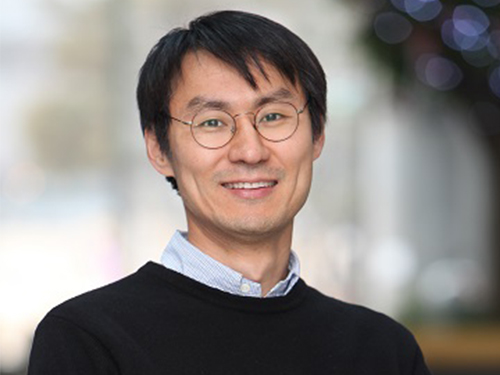 Professor Jung Awarded the Pople Medal by the APATCC
(Professor Yousung Jung)
Professor Yousung Jung of the Graduate School of EEWS won the Pople Medal from the Asia-Pacific Association of Theoretical & Computational Chemists (APATCC).
The Pople Medal has been awarded annually since 2007 to recognize young scholars in the fields of theoretical/computational chemistry in honor of Sir John Anthony Pople, who passed away in 2004. Dr. Pople was a British theoretical chemist and a Nobel laureate in 1998 for his development of computational methods in quantum chemistry.
The Pople Medal is awarded to scientists at or under the age of 45 in the Asia-Pacific region who have distinguished themselves through pioneering and important contributions.
Professor Jung was honored for his outstanding contributions to developing efficient electronic structure methods and their applications to energy materials discovery. He has published more than 120 papers in prestigious academic journals. He also has an h-index of 44, and has been cited more than 8,000 times.
2018.01.10 View 7864
Professor Jung Awarded the Pople Medal by the APATCC
(Professor Yousung Jung)
Professor Yousung Jung of the Graduate School of EEWS won the Pople Medal from the Asia-Pacific Association of Theoretical & Computational Chemists (APATCC).
The Pople Medal has been awarded annually since 2007 to recognize young scholars in the fields of theoretical/computational chemistry in honor of Sir John Anthony Pople, who passed away in 2004. Dr. Pople was a British theoretical chemist and a Nobel laureate in 1998 for his development of computational methods in quantum chemistry.
The Pople Medal is awarded to scientists at or under the age of 45 in the Asia-Pacific region who have distinguished themselves through pioneering and important contributions.
Professor Jung was honored for his outstanding contributions to developing efficient electronic structure methods and their applications to energy materials discovery. He has published more than 120 papers in prestigious academic journals. He also has an h-index of 44, and has been cited more than 8,000 times.
2018.01.10 View 7864 -
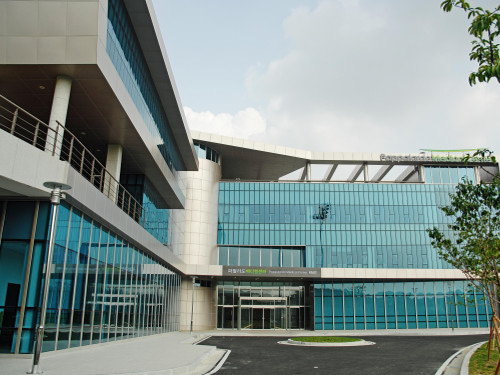 KAIST, a Family-Friendly Organization
KAIST has been acknowledged as a family-friendly organization by the Ministry of Gender Equality and Family. KAIST received the certification in recognition of having exemplary working systems for its employees, including flexible work hours, support for childcare and their education, and benefits for dependents. The certification will be valid from December 27, 2017 until November 30, 2020.
KAIST is putting every effort into creating a working environment that prioritizes work-life balance and provides various welfare benefits to all its employees. For instance, KAIST gives a maximum of three years of parental leave and shortens workhours for employees during their pregnancy. Operating multiple daycare centers also eases the burden of parents with infants and toddlers.
Moreover, KAIST has extended benefits such as providing times for families, prenatal diagnoses, and reducing working hours for employees who need to care for their infants. Furthermore, KAIST offers diverse classes on life-cycles and provides clinic services to all its members.
KAIST cooperates with the local community to operate a science camp for children of those serving in the military, in addition to children of faculty and staff members. It also offers cultural events during the semester, which are open to the public.
KAIST is managing a Customer Satisfaction Center, Center for Ethics and Human Rights, and an Ombudsperson’s office in an effort to address any issues raised by members of the KAIST community and an Innovation Day system was established in order to improve communication with them.
2018.01.10 View 3367
KAIST, a Family-Friendly Organization
KAIST has been acknowledged as a family-friendly organization by the Ministry of Gender Equality and Family. KAIST received the certification in recognition of having exemplary working systems for its employees, including flexible work hours, support for childcare and their education, and benefits for dependents. The certification will be valid from December 27, 2017 until November 30, 2020.
KAIST is putting every effort into creating a working environment that prioritizes work-life balance and provides various welfare benefits to all its employees. For instance, KAIST gives a maximum of three years of parental leave and shortens workhours for employees during their pregnancy. Operating multiple daycare centers also eases the burden of parents with infants and toddlers.
Moreover, KAIST has extended benefits such as providing times for families, prenatal diagnoses, and reducing working hours for employees who need to care for their infants. Furthermore, KAIST offers diverse classes on life-cycles and provides clinic services to all its members.
KAIST cooperates with the local community to operate a science camp for children of those serving in the military, in addition to children of faculty and staff members. It also offers cultural events during the semester, which are open to the public.
KAIST is managing a Customer Satisfaction Center, Center for Ethics and Human Rights, and an Ombudsperson’s office in an effort to address any issues raised by members of the KAIST community and an Innovation Day system was established in order to improve communication with them.
2018.01.10 View 3367 -
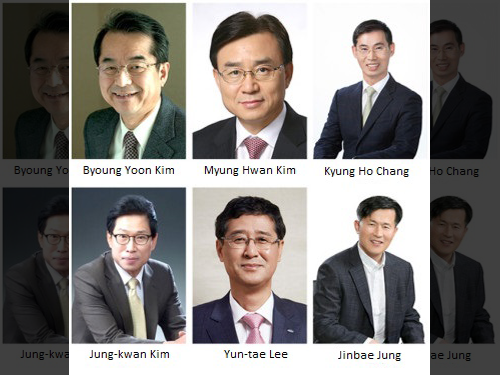 Distinguished Alumni Awards 2017 by KAIST Alumni Association
The KAIST Alumni Association announced six Distinguished Alumni Awardees for the year 2017.
Every year, the association selects alumni who have brought honor and distinction to the university through significant contributions to industry, academic achievements, or community service. Since 1992, a total of 95 alumni have been chosen for the distinguished alumni awards.
The recipients are playing major roles in society, and this year is no exception. The award will be given to the alumni during the KAIST New Year Ceremony on January 13 in Seoul.
Here are the six distinguished alumni of the year 2017.
The Director of Startup KAIST, Byoung Yoon Kim (M.S. in Physics) is one of the faculty who has brought entrepreneurship to KAIST. Before founding companies, he held the position of assistant professor at Stanford University. In 1995, he founded FiberProf Inc, commercializing research results from KAIST lab for their applications to test and measurement equipment for lab and production lines. He launched Novera Optics, Inc in 1999 which produced broadband access network equipment (WDM-PON) for FTFH application. Since 2014, he has been holding the position of director of KAIST Startup and inspiring entrepreneurship. He is being recognized for playing a crucial role in defining a successful model for technology startup ecosystems.
The President of LG Chem Ltd., and Head of Battery Research and Development, Myung Hwan Kim (M.S. in Chemical and Biomolecular Engineering) succeeded in developing and producing the first lithium ion batteries in Korea. His work contributed to Korea becoming the second most powerful nation in batteries. In particular, he obtained more orders from global automobile companies by successfully commercializing batteries for electronic vehicles, which led elevating national competitiveness. Recently, his company is leading the battery market for automobiles and power storage by developing novel materials and supplying optimal batteries to match each field.
The Director of INNOX Advanced Materials Co., Ltd., Kyung Ho Chang (M.S. in Chemistry and Ph.D. in Materials Science and Engineering) challenged himself in the Flexible Printed Circuit Board (FPCB) industry, which was mostly dominated by Japanese companies in 2001; however, he succeeded in localizing the materials. Now, his company is the number one for FPCB materials in Korea. FPCBs are a component used in most electronic devices, including smartphones and tablet PCs. Localizing the materials has brought about an import substitution effect as well as establishing a foundation for national competitiveness in FPCBs.
The Vice President of the Korea International Trade Association (KITA), Jung-kwan Kim (M.S. in Business) began his career from deputy director in Ministry of Trade, Industry and Energy. Throughout his career at MOTIE, he served as Director for Energy Development, Director General for Energy Industry Policy, Head Officer of Energy and Resources, and finally Vice Minister for MOTIE. Since joining KITA as the vice president in 2015, he has contributed to supporting overseas expansion of new industries and reinforcing trade competitiveness through opening new markets and providing customized consulting.
The CEO of Samsung Electro-Mechanics, Yun-tae Lee (M.S. and Ph.D. in Electrical Engineering) is an expert in designing semiconductors. While serving as Head of System LSI and Head of LCD in Samsung Electronics, he made significant contributions to projects involving semiconductors and displays, which are the company’s engine of growth. Moreover, by utilizing his insights from the component business and making bold decisions, he is leading the future of Samsung Electro-Mechanics.
The CEO of ENF Technology, Jinbae Jung (Ph.D. in Chemical and Biomolecular Engineering) reinforced national industrial competitiveness by developing high-performance chemicals that are used mostly in the production of semiconductors and displays. Especially, he succeeded in applying regeneration technology of thinners and developing various stripping liquidsHe also localized color pastes, which were heavily dependent on Japan, and improved the quality of color accuracy for LCD panels.
Notable Recipient of Distinguished Alumni Award
2018.01.05 View 8745
Distinguished Alumni Awards 2017 by KAIST Alumni Association
The KAIST Alumni Association announced six Distinguished Alumni Awardees for the year 2017.
Every year, the association selects alumni who have brought honor and distinction to the university through significant contributions to industry, academic achievements, or community service. Since 1992, a total of 95 alumni have been chosen for the distinguished alumni awards.
The recipients are playing major roles in society, and this year is no exception. The award will be given to the alumni during the KAIST New Year Ceremony on January 13 in Seoul.
Here are the six distinguished alumni of the year 2017.
The Director of Startup KAIST, Byoung Yoon Kim (M.S. in Physics) is one of the faculty who has brought entrepreneurship to KAIST. Before founding companies, he held the position of assistant professor at Stanford University. In 1995, he founded FiberProf Inc, commercializing research results from KAIST lab for their applications to test and measurement equipment for lab and production lines. He launched Novera Optics, Inc in 1999 which produced broadband access network equipment (WDM-PON) for FTFH application. Since 2014, he has been holding the position of director of KAIST Startup and inspiring entrepreneurship. He is being recognized for playing a crucial role in defining a successful model for technology startup ecosystems.
The President of LG Chem Ltd., and Head of Battery Research and Development, Myung Hwan Kim (M.S. in Chemical and Biomolecular Engineering) succeeded in developing and producing the first lithium ion batteries in Korea. His work contributed to Korea becoming the second most powerful nation in batteries. In particular, he obtained more orders from global automobile companies by successfully commercializing batteries for electronic vehicles, which led elevating national competitiveness. Recently, his company is leading the battery market for automobiles and power storage by developing novel materials and supplying optimal batteries to match each field.
The Director of INNOX Advanced Materials Co., Ltd., Kyung Ho Chang (M.S. in Chemistry and Ph.D. in Materials Science and Engineering) challenged himself in the Flexible Printed Circuit Board (FPCB) industry, which was mostly dominated by Japanese companies in 2001; however, he succeeded in localizing the materials. Now, his company is the number one for FPCB materials in Korea. FPCBs are a component used in most electronic devices, including smartphones and tablet PCs. Localizing the materials has brought about an import substitution effect as well as establishing a foundation for national competitiveness in FPCBs.
The Vice President of the Korea International Trade Association (KITA), Jung-kwan Kim (M.S. in Business) began his career from deputy director in Ministry of Trade, Industry and Energy. Throughout his career at MOTIE, he served as Director for Energy Development, Director General for Energy Industry Policy, Head Officer of Energy and Resources, and finally Vice Minister for MOTIE. Since joining KITA as the vice president in 2015, he has contributed to supporting overseas expansion of new industries and reinforcing trade competitiveness through opening new markets and providing customized consulting.
The CEO of Samsung Electro-Mechanics, Yun-tae Lee (M.S. and Ph.D. in Electrical Engineering) is an expert in designing semiconductors. While serving as Head of System LSI and Head of LCD in Samsung Electronics, he made significant contributions to projects involving semiconductors and displays, which are the company’s engine of growth. Moreover, by utilizing his insights from the component business and making bold decisions, he is leading the future of Samsung Electro-Mechanics.
The CEO of ENF Technology, Jinbae Jung (Ph.D. in Chemical and Biomolecular Engineering) reinforced national industrial competitiveness by developing high-performance chemicals that are used mostly in the production of semiconductors and displays. Especially, he succeeded in applying regeneration technology of thinners and developing various stripping liquidsHe also localized color pastes, which were heavily dependent on Japan, and improved the quality of color accuracy for LCD panels.
Notable Recipient of Distinguished Alumni Award
2018.01.05 View 8745